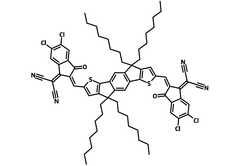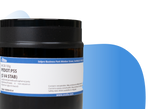IDIC-4Cl, non-fullerene acceptor for all-small-molecule or polymer solar cells
Low price, high purity (≥99%) IDIC-4Cl available for priority dispatch and worldwide shipping
Specifications | Pricing and Options | MSDS | Literature and Reviews
IDIC-4Cl (CAS number 2361961-01-3) is the chlorinated derivative of IDIC that is commonly used as a non-fullerene acceptor in highly efficient all-small-molecule or polymer solar cells.
The introduction of the chlorine atoms on the peripheral end groups in IDIC-4Cl leads to a more planar structure with good crystallinity.
A binary all-small-molecule OSCs obtained the highest efficiency of 9.58% with ZR1 as the small molecule donor and IDIC-4Cl as the non-fullerene acceptor (Device 1). Post treatment with thermal annealing (TA) and solvent vapor annealing (SVA) of active layer materials with BSCl as small molecule donor and IDIC-4Cl as the non-fullerene acceptor, a a PCE of 13.03% was achieved (Device 2).
Device 1 structure: ITO/PEDOT:PSS/ZR1:IDIC-4Cl/Al
| Thickness (nm) | VOC (V) | JSC (mA cm-2) | FF (%) | PCE (%) |
| N/A | 0.776 | 18.27 | 67.96 | 9.64 |
Device 2 structure: ITO/PEDOT:PSS/BSCl:IDIC-4Cl/Al
| Thickness (nm) | VOC (V) | JSC (mA cm-2) | FF (%) | PCE (%) |
| N/A | 0.865 | 21.5 | 70 | 13.03 |
General Information
| CAS Number | 2361961-01-3 |
| Chemical Formula | C74H78N4O2S2 |
| Purity | ≥99% (1HNMR) |
| Full Name | 2,2'-((2Z,2'Z)-((4,4,9,9-tetraoctyl-4,9-dihydro-s-indaceno[1,2-b:5,6-b']dithiophene-2,7-diyl)bis(methanylylidene))bis(5,6-dichloro-3-oxo-2,3-dihydro-1H-indene-2,1-diylidene))dimalononitrile |
| Molecular Weight | 1119.6 g/mol |
| HOMO / LUMO | HOMO = - 5.72 eV, LUMO = - 4.10 eV [1] |
| Solubility | Chloroform, toluene, chlorobenzene |
| Form | Maroon powder/crystal |
| Synonyms | C8-IDIC-4Cl |
| Classification / Family | n-type non-fullerene electron acceptors, Organic semiconducting materials, Low band-gap small molecule, Small molecular acceptor, Organic photovoltaics, Polymer solar cells, NF-PSCs. |
Chemical Structure

Pricing
| Batch | Quantity | Price |
| M2262A1 | 100 mg | £320 |
| M2262A1 | 250 mg | £640 |
| M2262A1 | 500 mg | £1150 |
*for 5 - 10 grams order quantity, the lead time is 4 - 6 weeks
MSDS Documentation
Literature and Reviews
- All-small-molecule organic solar cells with over 14% efficiency by optimizing hierarchical morphologies, R. Zhou et al., Nature Commun., 10, 5393 (2019); DOI: 10.1038/s41467-019-13292-1.
- Modulation of Donor Alkyl Terminal Chains with the Shifting Branching Point Leads to the Optimized Morphology and Efficient All-Small-Molecule Organic Solar Cells, Q. Wu et al., ACS Appl. Mater. Interfaces, 12, 22, 25100–25107 (2020); DOI: 10.1021/acsami.0c03977.
- The post-treatment effects on open circuit voltages and device performances in a high efficiency all-small-molecule organic solar cell, Z. Zhang et al., J. Mater. Chem. C, 8, 15385-15392 (2020); DOI: 10.1039/D0TC03043K.
Related Products
Semiconducting polymers for bulk heterojunction, OPV, OLED, OFET and perovskite interfaces and solar cell research.

 IDIC-4Cl MSDS sheet
IDIC-4Cl MSDS sheet
